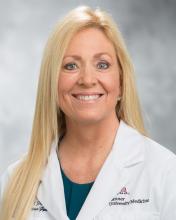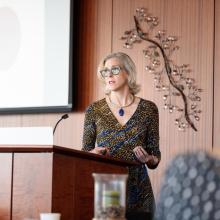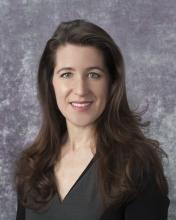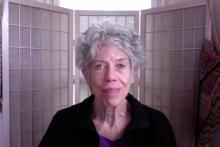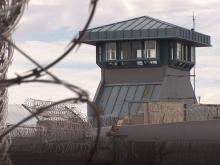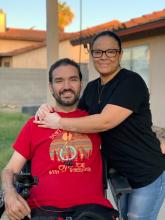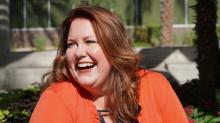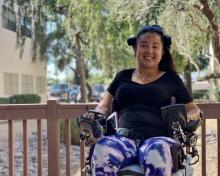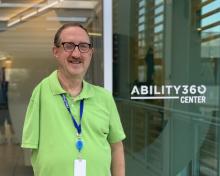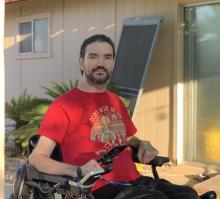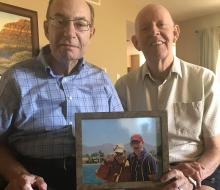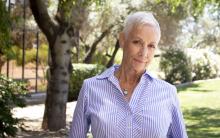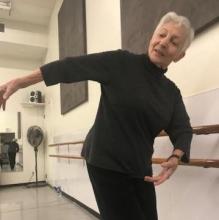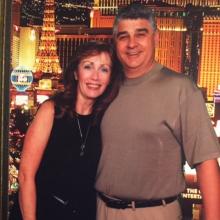In this episode, we talk about the intersection between sex and menopause. Between 17% and 45% of postmenopausal women say they find sex painful, and that’s where Dr. Debra Wickman comes in. She is Director of Female Sexual Medicine Vulva Disorders and Menopause Health at Banner University Medical Center in Phoenix, Arizona. Wickman talks about how women often tolerate painful sex and why embracing our intimate anatomy can be the first step toward healing.
Aging & InAccessible
What is it really like to grow old in the Grand Canyon State? Is Arizona still a paradise for retirees? The "Aging" podcast series explores the ups and downs of growing old and explores important issues affecting the state's elderly.
And, in the "InAccessible" podcast series, hear stories of people with disabilities and organizations making the state more accessible.
Take Our Listener Survey
Period, The End Episode 5: Menopause And The Workplace
Let us know what you think. Please take our survey.
We know many women will experience menopausal symptoms, and they don’t just happen at home. Tamsen Fadal, an Emmy-Award winning TV journalist and now menopause advocate, talks about navigating those symptoms at work. We’ll also hear from Dr. Jewel Kling, a professor of medicine and chair of the division of Women's Health Internal Medicine at Mayo Clinic in Scottsdale, Arizona.
Period, The End Episode 4: About Hormones
Let us know what you think. Please take our survey.
We’re calling this episode Menopausal Hormone Therapy 101. We won’t cover everything. Think of it like a primer so you can more comfortably talk to your provider — or know when to walk away. Joining us is Dr. Stephanie Faubion, director of Mayo Clinic Center for Women's Health in Florida; she’s also medical director of the Menopause Society.
Period, The End Episode 3: A Time of Risk
Let us know what you think. Please take our survey.
The menopausal transition can affect our cardiovascular health in ways that can’t be explained by age alone. Dr. Rebecca Thurston is a principal investigator for SWAN, the Study of Women’s Health Across the Nation, and also leads the MSHEART and the MSBRAIN studies, which look at menopause and the cardiovascular/brain connection.
Period, The End Episode 2: Menopause in any Language
Let us know what you think. Please take our survey.
Vasomotor symptoms, aka hot flashes and night sweats, are the most common manifestations of menopause. Women of all cultures have different names for it and ways to cope. We talk to Professor Lynette Sievert, a biological anthropologist at UMASS Amherst, whose studies of menopausal women span the globe.
Period, The End Episode 1: The Grandmother Hypothesis
Let us know what you think. Please take our survey.
KJZZ's Kathy Ritchie likes to talk about things that make most people uncomfortable — like menopause. In this episode, Kathy dives into the big why. Why do we go through "the change?" Anthropology professor Kristen Hawkes takes us to Africa, where the study of one of the last hunter-gatherer tribes led her to this conclusion: menopause is an adaptive advantage.
Inaccessible: Downwinders of Mohave County
Let us know what you think. Please take our survey.
During and after World War II, the United States conducted hundreds of nuclear tests in the American Southwest, mainly Nevada and New Mexico. The radioactive fallout produced by these explosions traveled hundreds of miles, crossing state lines into Arizona and Utah. People who lived and worked in areas exposed to this radiation were more likely to develop cancer and other illnesses. They are known as downwinders. But not all of them are created equal in the eyes of the federal government.
Aging: Growing Old in Arizona Prisons
Let us know what you think. Please take our survey.
Prisons aren't designed to accommodate the aging. Think about it: there are stairs, narrow doorways, long corridors, and bunk beds. About 1 in 4 inmates in Arizona prisons is aged 55 plus, and the ACLU estimates nearly half of all inmates over 50 have a chronic health condition. All of this is in a system that doesn't provide constitutionally adequate healthcare. In this episode, Nathan Collins explores the difficulties older prisoners face while incarcerated and what advocates of criminal-justice reform are doing to help.
InAccessible: It's All About the Money (and Healthcare)
Let us know what you think. Please take our survey.
As the COVID19 pandemic continues, millions of Americans have found themselves without work, and people with disabilities have been hit especially hard. In this episode, Zoie Simon searches for a new job in the midst of worldwide economic uncertainty. Meanwhile, host Andrea Pasquale explores some of the options and protections for unemployed people with disabilities. How secure is Arizona's disability safety net?
Let us know what you think. Please take our survey (https://heararizona.org/
InAccessible: Looking for Help in a Public Health Crisis
Let us know what you think. Please take our survey.
The COVID19 pandemic is uniquely affecting the lives of people with disabilities, and many people who have underlying health conditions are more susceptible to the virus. In this episode, host Andrea Pasquale and producer Jaye McAuliffe search for resources that can help people with disabilities during a public health crisis. And Jon Meyers of the Arc of Arizona proposes ideas for how to be more prepared for a crisis like this in the future.
Let us know what you think. Please take our survey (https://heararizona.org/
InAccessible: Building Solidarity Using Support Groups
Let us know what you think. Please take our survey.
Without access to independent housing or reliable transportation, some people with disabilities experience intense isolation. In this episode, host Andrea Pasquale and producer Jaye McAuliffe explore the ways people with disabilities build community and solidarity among each other. And Candice Bennett and Jim Warner talk about supporting one another while living in a nursing home.
Let us know what you think. Please take our survey (https://heararizona.org/
InAccessible: Universal Design
Let us know what you think. Please take our survey.
People with disabilities can face a double-edged sword when it comes to finding housing. Not only is housing in Phoenix becoming increasingly expensive, but it can also be hard to find a home that’s accessible. In this episode, Host Andrea Pasquale explores the concept of Universal Design, the idea that buildings should be built with accessibility features up front instead of as an afterthought. And John Beaubien describes the modifications he needed to make to his home in order to make it livable.
Let us know what you think. Please take our survey (https://heararizona.org/
InAccessible: Getting Around in The Valley of the Sun
Let us know what you think. Please take our survey.
In a metro-area like Phoenix, how easy is it for people with disabilities to get around? And what happens when you don’t have the money to pay for accessible options? In the first episode of (In)Accessible, Andrea Pasquale and Jaye McAuliffe introduce us to Marcos Castillo, a wheelchair user who navigates roadblocks within the Valley’s public transit system while trying to get an accessible van to call his own. Marcos talks about some of the transportation options in Phoenix that able-bodied people take for granted.
Let us know what you think. Please take our survey (https://heararizona.org/
Aging: Grandfamilies
Let us know what you think. Please take our survey.
Raising children is hard. Raising a child in your retirement years might be even harder. But that's the reality for more than 70,000 Arizona grandparents. Issues of addiction, incarceration, and mental illness are leaving many Americans unable to care for their kids, so more and more grandparents nationwide are stepping into the role of second-time parent. These "grandfamilies" face emotional, financial, and legal hurdles. But many grandparent caregivers also discover rewarding relationships and say they wouldn't have it any other way.
Let us know what you think. Please take our survey (https://heararizona.org/
Aging: Growing Old LGBT
Let us know what you think. Please take our survey.
As we age, we may have to rely more on other people. But for many older adults who identify as lesbian, gay, bisexual or transgender, the idea of relying on family for support, or of putting your trust in strangers can be complicated or painful. In this episode, Kathy Ritchie explores the financial challenges, discrimination, and emotional traumas that many older LGBT people face.
Let us know what you think. Please take our survey (https://heararizona.org/
Aging: Older Women in Poverty
Let us know what you think. Please take our survey.
We like to think when we get older we'll be able to comfortably retire, and not have to worry about the costs of housing, healthcare, or other necessities. But 16 percent of American women age 65-and-over live at or below the poverty line. And the numbers keep growing. In this episode, Kathy Ritchie speaks with older Phoenix women experiencing poverty and Arizona organizations responding to the issue.
Let us know what you think. Please take our survey (https://heararizona.org/
Aging: Reinventing Retirement
Let us know what you think. Please take our survey.
It’s easy to oversimplify the idea of growing old. The fact is, the experience will be different for each of us. Some people keep working well past retirement age because they're so passionate about what they do, others use retirement to explore new passions, and others make retirement plans that change or don't work out. In this episode, Kathy Ritchie introduces us to five Arizonans whose retirements are anything but ordinary.
Let us know what you think. Please take our survey (https://heararizona.org/
Aging: Sex and Dementia
Let us know what you think. Please take our survey.
We don’t like to talk about aging, sex, or illness…so it makes sense that mentioning aging and sex and dementia in one conversation is something we’d especially like to avoid. But there are a lot of people who can’t help but confront these difficult realities. What happens when the partner you've loved for years is coping with a life-altering diagnosis? Does physical intimacy have to end once you've reached a certain age or state of health? In this episode, Kathy Ritchie explores a rarely spoken about challenge many couples face.
Let us know what you think. Please take our survey (https://heararizona.org/






